Najiha Al Asmar recently graduated the Masters degree program at Gaia University while working to create access to healthy food in urban systems in the Bay area of San Francisco in the USA. Read more about her learning experiences with Ecotherapy and how she integrated these practices into her food workshops as a part of her MSc at Gaia University.
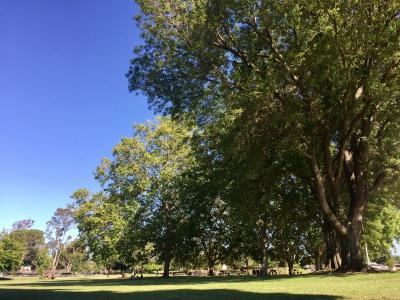
Many doctors will tell you that the best way to stay healthy is to eat well, be active, and get enough rest. But humans are social animals, we need to maintain strong social ties and respect that which gives us life in the first place. I took a step further in defining wellness to include establishing and maintaining healthy relationships with a supportive community, and Mother Earth. In my search for nature-connection enlightenment, I came upon a method that encompasses the philosophy of healing others with nature through a method called ecotherapy. The book, Ecotherapy: Healing with Nature in Mind defines ecotherapy as applied ecopsychology. Ecopsychology is the study of the psychological processes that tie us to the world or separate us from it. Therefore, ecotherapy is the application of ecopsychology that encourages healing and growth nurtured by healthy interaction with the Earth and includes working with the body (Buzzell and Chalquist).
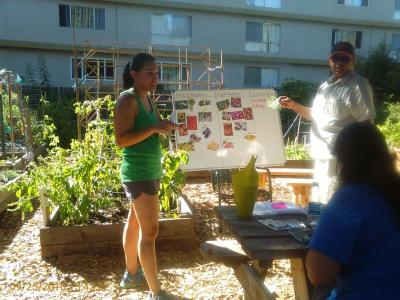 The current world that we live in is extremely technology-driven, which can be a means to communicate as well as a learning and processing tool. As the presence of technology has expanded in our lives, many of us have lost our connection to the natural world. Technology is the main reason for why a vast majority of the population is disconnected from the natural world. My intention is to reinforce and inspire a more nature-connected perspective not only for personal and professional development but to inspire others who may or may not be aware of this connection.
The current world that we live in is extremely technology-driven, which can be a means to communicate as well as a learning and processing tool. As the presence of technology has expanded in our lives, many of us have lost our connection to the natural world. Technology is the main reason for why a vast majority of the population is disconnected from the natural world. My intention is to reinforce and inspire a more nature-connected perspective not only for personal and professional development but to inspire others who may or may not be aware of this connection.
In my work, I facilitate organic gardening and nutrition awareness. I do this through effective discussion, meditation, and exercise, which helps to build a relationship with mother nature by focusing on how she feeds, nourishes, and heals us. I’m establishing myself as a health consultant for personal diet, social engagement, and nature connection. I help clients recognize the qualitative benefits of learning about how food is planted, and the tangible connection we create by harvesting, cooking, and nourishing the body with high-quality food. During these sessions, we dive deep into critical reflection upon our own relationship with nature and our place in the world.
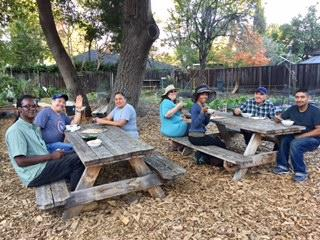 Many Western psychologists focus therapy on the individual/family pathology, without tuning in to the larger context of interconnected beings. Lab and clinical investigations have found that within five minutes of viewing a nature setting positive changes in blood pressure, heart activity, muscle tension, and brain electrical activity occur. The disconnect between humans and nature has caused us to lay waste to our planet but also to ourselves; mentally, physically, and spiritually. Ecotherapy is a call to address the consumerist society that is destroying our earth and ourselves.
Many Western psychologists focus therapy on the individual/family pathology, without tuning in to the larger context of interconnected beings. Lab and clinical investigations have found that within five minutes of viewing a nature setting positive changes in blood pressure, heart activity, muscle tension, and brain electrical activity occur. The disconnect between humans and nature has caused us to lay waste to our planet but also to ourselves; mentally, physically, and spiritually. Ecotherapy is a call to address the consumerist society that is destroying our earth and ourselves.
The Earthbody Institute’s ‘Online Introduction to Ecotherapy’ helped me engage with the topic of ecotherapy. This course was developed by psychotherapist Ariana Candell, a dance/movement therapist and pioneer in the emerging field of Somatic Ecotherapy. Candell is passionate about transforming the field of psychotherapy to include connecting to the natural world as an essential part of healing. More than ever, people are able to access techniques and guides to apply ecotherapy to their own lives.
I recognized that I had been engaging in ecotherapy throughout my whole life, but I didn’t use the term. Ecotherapy is the healing and nourishing sensations that stem from being out in nature and appreciating nature through walks, food, song, dance, art, and meditation.
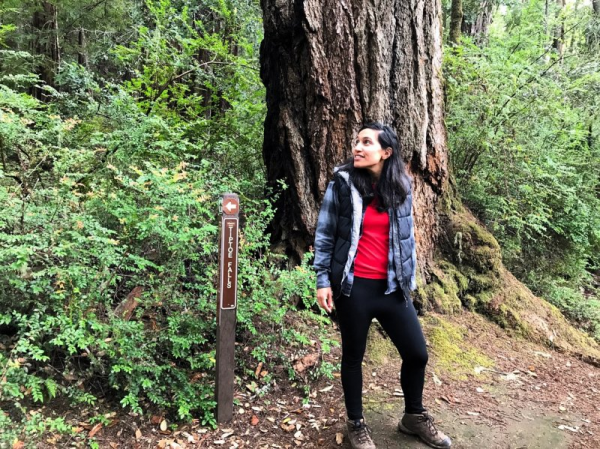 When out in nature or thinking about nature, I slow down and pay attention to the empowering qualities of calmness and patience. I appreciate the wondrous gifts of nourishment that come from eating the bounties of mother earth. I sense the fulfilment in others when they grow for themselves, and witness the miraculous existence of life from seed to seedling to becoming an adult plant. This awareness is ecotherapy in action. We see the magical effects that mother nature’s gifts have on our body, mind, and soul. When we come together around the table to eat with each other, we’re connecting not only to nature by eating nutritious meals but we are also connecting to other forms of nature: humans. Sharing conversations and food has a profound positive effect on the psyche. I often enjoy seeing the other’s pleasure when eating a wholesome meal we created together. It heightens the empathic and corporal recognition of the body’s interconnection with all living beings and gives us a profound sense of our place in the ecosystem.
When out in nature or thinking about nature, I slow down and pay attention to the empowering qualities of calmness and patience. I appreciate the wondrous gifts of nourishment that come from eating the bounties of mother earth. I sense the fulfilment in others when they grow for themselves, and witness the miraculous existence of life from seed to seedling to becoming an adult plant. This awareness is ecotherapy in action. We see the magical effects that mother nature’s gifts have on our body, mind, and soul. When we come together around the table to eat with each other, we’re connecting not only to nature by eating nutritious meals but we are also connecting to other forms of nature: humans. Sharing conversations and food has a profound positive effect on the psyche. I often enjoy seeing the other’s pleasure when eating a wholesome meal we created together. It heightens the empathic and corporal recognition of the body’s interconnection with all living beings and gives us a profound sense of our place in the ecosystem.
A technique that has awakened new ways for me to connect to nature and changed my perception of the natural world was that of “opening to the other”. “Opening to the other”, consists of letting nature call to you, instead of you actively calling or looking for nature. You let go of any expectations that nature provides in order to be receptive to new gifts and attributes that may arise by simply exposing yourself to nature. One day I was on a hike and decided to apply “opening to the other” by consciously telling myself to not seek out anything in particular while on the hike, but to be receptive to what stimulates my senses. Along the trail, I was tantalized by the busy buzzing of a bumblebee. The bumblebee was collecting nectar from flowers. I stopped to look and listen. I paid attention to the fluid movements of the bee as it hovered effortlessly from flower to flower. I tried to imagine what it would feel like to be able to have the agility and finesse to fly like a bee. I stood there for a while just taking in the presence of this living being until it went on its way to perhaps find more flowers to explore. In that moment I gave gratitude to the gifts of movement and sight. I became more in tune with the gifts of the every day and realized the miracle it is to be alive.
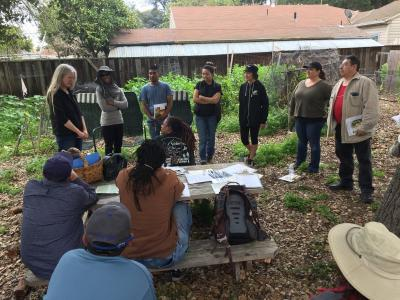 When I became comfortable with more ecotherapy exercises I invited participants to engage in a present-oriented sensory meditation. A simple exercise of becoming aware of your surroundings and sensations when breathing deeply outside in nature can do wonders for your health; grounding oneself to recognize the wondrous gifts that mother nature provides to us each and every day. Are there birds singing? What do you smell? How are you feeling? How do you want to express yourself in this moment? As you move through natural settings and notice the trees, what do the trees make you feel? What sort of gratitude can you give to nature? What do you notice?
When I became comfortable with more ecotherapy exercises I invited participants to engage in a present-oriented sensory meditation. A simple exercise of becoming aware of your surroundings and sensations when breathing deeply outside in nature can do wonders for your health; grounding oneself to recognize the wondrous gifts that mother nature provides to us each and every day. Are there birds singing? What do you smell? How are you feeling? How do you want to express yourself in this moment? As you move through natural settings and notice the trees, what do the trees make you feel? What sort of gratitude can you give to nature? What do you notice?
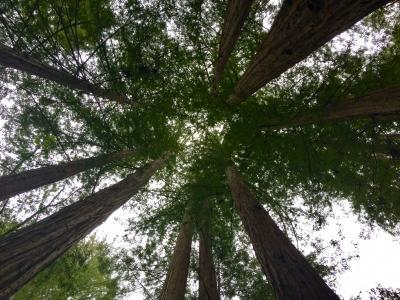 The disconnect between humans and nature has been the cause of the immense damage to our planet and therefore, our self-destructive behaviours have increased. Many people with psychological disorders are unaware of the connection between our pain and the world’s pain. A quote from author Sharon Blackie describes this well. “We can possess all the fine goods that our civilisation has to offer us; we can have important jobs, and social status, and tone our bodies on all the latest machines – but without a sense of belonging to the world, we feel empty and our lives lack meaning.” In Blackie’s book, “If Women Rose Rooted: The Power of the Celtic Woman”, she describes embracing the feminine power that is in everyone and Gaia, Mother Earth. She implies that achieving capitalist success, with it’s adorning materialistic commodities and social-status might make our lives more tolerable and acceptable; but it won’t fill the void of love that people and all living beings need to thrive. She goes on to say, “It’s no accident that this systematic suppression of the feminine has been accompanied down the centuries not only by the devaluation of all that is wild and instinctual in our own natures, but by the purposeful destruction of natural ecosystems. We long ago turned our backs on the planet which gives us life.”
The disconnect between humans and nature has been the cause of the immense damage to our planet and therefore, our self-destructive behaviours have increased. Many people with psychological disorders are unaware of the connection between our pain and the world’s pain. A quote from author Sharon Blackie describes this well. “We can possess all the fine goods that our civilisation has to offer us; we can have important jobs, and social status, and tone our bodies on all the latest machines – but without a sense of belonging to the world, we feel empty and our lives lack meaning.” In Blackie’s book, “If Women Rose Rooted: The Power of the Celtic Woman”, she describes embracing the feminine power that is in everyone and Gaia, Mother Earth. She implies that achieving capitalist success, with it’s adorning materialistic commodities and social-status might make our lives more tolerable and acceptable; but it won’t fill the void of love that people and all living beings need to thrive. She goes on to say, “It’s no accident that this systematic suppression of the feminine has been accompanied down the centuries not only by the devaluation of all that is wild and instinctual in our own natures, but by the purposeful destruction of natural ecosystems. We long ago turned our backs on the planet which gives us life.”
In order to regain a sense of belonging in the world and rid ourselves of this lonely disease, we need to integrate a regimen of connecting to mother earth. We can take it one step at a time by letting ourselves reflect upon the role that nature has played throughout our lives. We can ask ourselves questions like: Where did my food come from? Did my parents live close to nature growing up? Did I grow up near nature and did I interact with her? Do I currently live close to nature and how do I interact with nature? Writing these reflections down in a journal can serve as a reference point for reconnecting with the natural world.
Reconnection can be as simple as establishing a relationship with a tree near your work or home. Look at the tree through a window or sit next to it. Notice the slow and steady changes it makes during the seasons. You can begin to appreciate the tree’s strength, and try to imagine yourself embracing these qualities. On a hot and sunny day, you can sit underneath the tree and show gratitude for the shade it casts. Maybe you are moved to write a poem about the tree. This can begin a journey for reconnecting with Gaia.
Sharon Blackie describes this reconnection: “We are not separate from this Earth; we are a part of it, whether we fully feel it in our bodies yet or not.”
This ecotherapy topic was inspired and supported by my master’s program in Gaia University. I am acquiring an MSc degree in Integrative Eco-social Design – creating healthy communities in urban societies. Gaia University provided me with the tools and guidance to pursue projects and build life skills in the field of ecotherapy. I used Gaia U networks to interview professionals in the field of ecotherapy and practical methods to document my work in an online living portfolio.
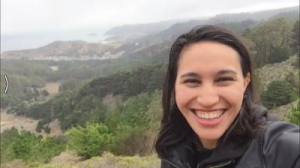
Najiha’s passion is creating healthy and sustainable systems in urban societies. She lives and works in the San Francisco Bay Area, where she is a Program Specialist for the 501c3 Fresh Approach. She strives to make healthy, nutritious food more accessible for everyone and encourages others to follow an active lifestyle more involved with nature. She enjoys camping, reading, and biking in her spare time.
Bibliography
- Candell, Ariana. LMF
- T, R-DMT, Ecotherapist Body-Centered Psychotherapy, Dance Movement Therapy, Ecotherapy. Informational interview on Ecotherapy.Earthbody Institute. Phone call. May 1, 2018.
- Candell, A. The Earth Body Institute: Online Introduction to Ecotherapy. https://theearthbodyinstitute.com/online-introduction-to-ecotherapy/
- Ecotherapy Healing with Nature in Mind, Buzzell, L. & Chalquist, C.
- If Women Rose Rooted: The Power of the Celtic Women. Blackie, S.

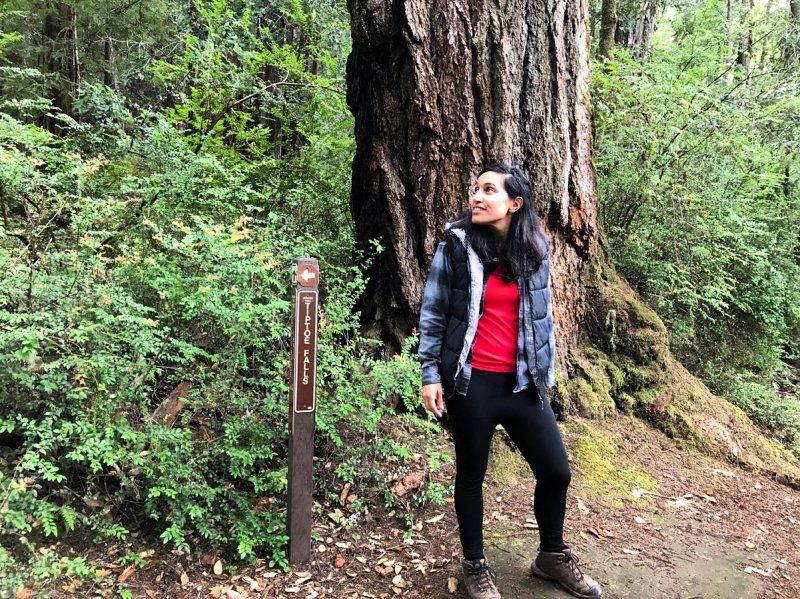
Great !!!!
Great article!!
Great!
I was reading some of your posts on this internet site and I believe this web site is really instructive! I truly appreciate your efforts and I will be waiting for your next post thank you once again.